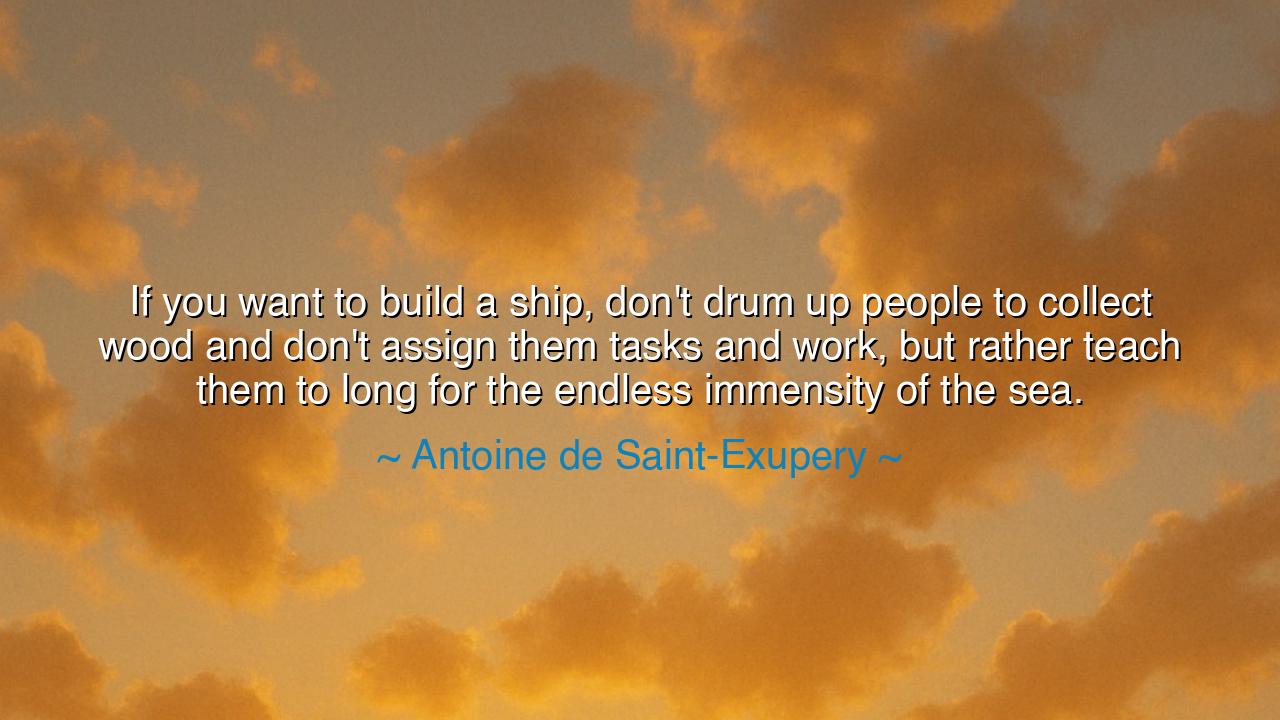
If you want to build a ship, don't drum up people to collect
If you want to build a ship, don't drum up people to collect wood and don't assign them tasks and work, but rather teach them to long for the endless immensity of the sea.






The poet and aviator Antoine de Saint-Exupéry, gazing beyond the labors of men, proclaimed: “If you want to build a ship, don’t drum up people to collect wood and don’t assign them tasks and work, but rather teach them to long for the endless immensity of the sea.” In this vision lies a wisdom older than empires—that true creation springs not from orders and commands, but from awakening desire in the soul. For when men and women burn with longing for the sea, they will carve their own oars, raise their own masts, and sail toward destiny without need of lash or command.
The ship becomes here a symbol of great endeavor, whether the founding of a nation, the birth of a dream, or the shaping of a people. To build such things is not merely to gather material or assign duty, but to kindle in human hearts the fire of vision. When the spirit sees the horizon and yearns for it, the body will follow of its own will. The ancients taught this also: that leaders are not those who rule by force, but those who awaken within others the strength they already possess.
The sea, described as “endless immensity,” is the realm of the unknown, of possibility, of freedom both perilous and divine. It is not mere water, but the boundless expanse of life’s calling. To long for the sea is to long for more than labor or achievement—it is to long for transcendence. Those who yearn for it are transformed, no longer servants to commands, but seekers of destiny.
Consider the folly of those who think leadership is command alone. They may gather wood, they may assign tasks, but what they build will lack soul, and when storms strike, it will shatter. But if a leader instills longing for the greater vision, then every hand will work with zeal, every heart with devotion, and even the hardships of labor will feel like steps toward glory. The vessel thus born is not only a ship but a monument to shared purpose.
Let this teaching be passed down: to inspire is greater than to order, to awaken longing is greater than to compel action. The endless immensity of the sea calls to all souls who dare to dream beyond the shore. And the leader who can rouse that longing will not merely build ships, but awaken voyagers, and not merely direct labor, but guide generations toward horizons yet unseen.






TNThi Phuong Thao Nguyen
This quote makes me think about motivation in a whole new way. Instead of focusing on productivity and effort, Saint-Exupery suggests fostering a connection to something bigger—a desire to achieve something meaningful. But is this realistic for every project or goal? Does every team or individual have the capacity to be driven purely by passion, or is there a time for clear structure and tangible steps to make things happen?
DXDong Duong Xuan
Saint-Exupery’s idea is fascinating—it’s about igniting passion rather than simply assigning work. But I can’t help but wonder, can you really teach someone to long for something they don't inherently care about? How do you create that deep sense of longing and purpose in people? And is this a strategy that works universally, or are some people more motivated by tasks and structure than by an idealistic vision?
MTMai Truc
I love this quote because it speaks to the deeper motivation that drives people. It’s about creating a desire and a sense of purpose, not just the act of completing a task. But it raises an interesting question: what happens when the vision is unclear or when people don’t share the same longing for the 'endless immensity of the sea'? Can a leader still create that desire, or does it take a collective vision to truly inspire change?
NNThanh Nguyen Nguyen
This quote reminds me of the power of purpose and vision in leadership. Instead of focusing on the 'how' and 'what' of work, Saint-Exupery suggests that the 'why' is what truly inspires people. It’s a beautiful sentiment, but I wonder—does this apply to all situations? Are there times when practical tasks and clear instructions are necessary, or can vision alone drive a group toward success?
HDnguyen bo hoang duy
Saint-Exupery’s quote highlights the importance of inspiration over mere task management. It made me think about leadership and motivation. Instead of just assigning duties, great leaders inspire passion and vision. But how do we balance this idea with the need for practical action? Can inspiration truly drive people to take initiative, or do we still need clear tasks and direction to achieve complex goals? How do we find that balance?